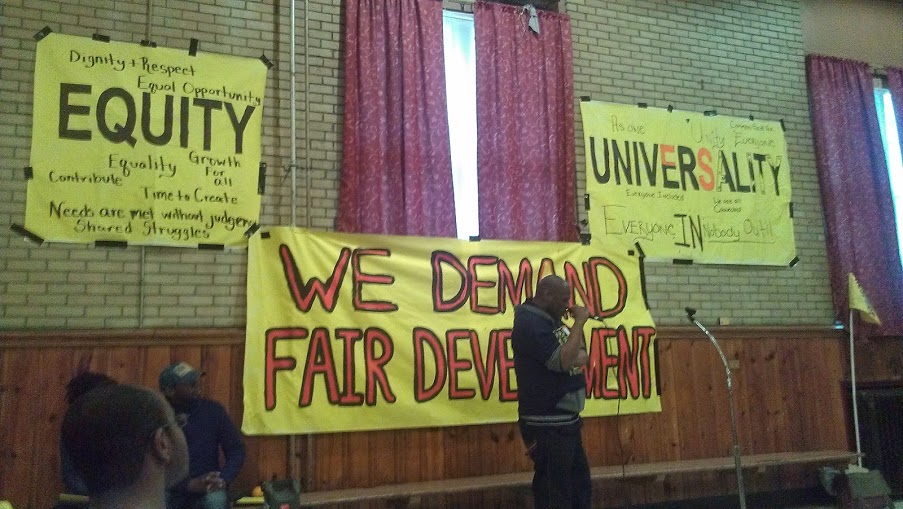United Workers Forum: Fair Development Includes Using Surplus Homes to Create Permanently, Truly Affordable Housing for All

At the United Workers’ Fair Development Forum at the end of March, Baltimore residents critiqued the city’s “trickle down” approach to development, and put forth a new vision for the city. At a gathering that featured spirited singing, tearful testimonies, and irrepressible hope, residents called for a new development approach with public investment that ensures community control and truly affordable housing for all, generation after generation.
Renters, homeowners, and persons experiencing homelessness came to the microphone at St. Wenceslaus Church in an East Baltimore neighborhood shadowed by the ever-growing Johns Hopkins Medical Center. They shared stories of their personal struggles to balance bills and pay the rent and mortgages, and to maintain employment while sleeping in abandoned buildings. And while Baltimore may not be the “hot” real estate market that is Boston, San Francisco, and New York City, many residents described being displaced by landlords looking to profit, driving rising rents and condo conversions.
“[T]his housing situation in Baltimore City is broken and we need to speak up to change the system,” said Shantress Wise, a United Workers’ member and leader. “The developers that come in, they’re supposed to give money back to the community and they’re not doing that. And it’s hard to find affordable housing because many of the houses are vacant.” Wise spoke about being serially displaced: forced from housing via development, unemployment, and sickness. Wise spent two stints in a homeless shelter and now is in temporary, transitional housing, looking for a permanent home.
Like many Rust Belt cities, Baltimore has an abundance of vacant housing units. Yet 4,000 people are homeless each night, roughly 7,500 homeowners face foreclosure annually, and tenants unable to make rental payments are forced into court proceedings yearly – last year 120,000 court appearances were made by tenants.
Homeowners complained of declining neighborhoods, renters spoke of housing that was either too pricey or substandard, and homeless persons recounted their challenges to keep warm, maintain hope, and protect their dignity.
The rally included a video of community-based revitalization in Boston’s Dudley area, which once had many of the same vacant housing issues as many parts of Baltimore. United Workers’ organizers and leaders touted the Dudley Street Neighborhood Initiative as one that was participatory and equitable – utilizing a community land trust model to keep housing permanently affordable and under the democratic control of community, not investors. Surrounded by banners proclaiming the human rights principles of Universality, Equity, Participation, Transparency, and Accountability, members of the East Baltimore community made a commitment to doing the hard work of educating and organizing their neighbors to win Fair Development in Baltimore.
The rally is the first of a series of community speak-outs in the first phase of a three-part plan to create a vibrant community-controlled, non-speculative housing sector as a cornerstone of Baltimore development.
